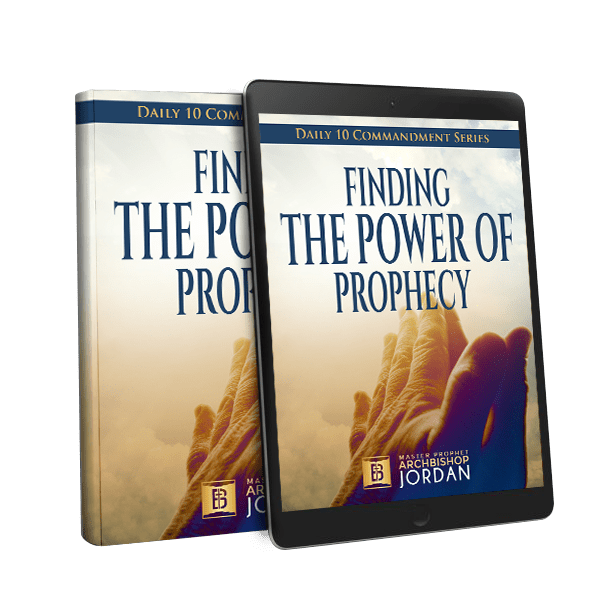
Understand How Trance Relates to the Prophetic
Prophecy is said to be a “human transmission of allegedly divine messages”(Nissinen, Seow, & Ritner, 2003). It is also classified as another distinctive branch of the consultation of the divine, which is generally known as ‘divination’. They further explained that among other types of divination, prophecy falls to the non-inductive type—and goes to show that prophets do not use methods which are based on systematic observations but rather act as “direct mouthpieces of gods” to communicate with humanity.
Prophecy is said to be a “human transmission of allegedly divine messages”. Nissinen, Seow and Ritner (2003) also identified the components that make up the prophetic transmission process: the divine sender of the message, the message itself, the human transmitter of the message, and the recipient(s) of the message. In order to justify the authenticity of the message, the process, along with the components, should be transparently written and identified as specimen of the prophecy.
Trancing Prophets
In one of the chapters in the book of Yocum (1976), the experience of a first-timer prophet was told: At that time, two hundred people would gather in Williamston every month from charismatic groups all over the state to spend a day praying and worshiping God. The room was crowded and hot, the lighting a little too dim. But every face expressed the joy of being in God’s presence. Almost every face, that is; I felt miserable. The meeting had begun as joyfully for me as for anyone, but after perhaps twenty minutes a simple thought had started to distract me. I had been distracted thousands of times before while trying to pray, but this was different. One simple thought had entered my mind and just would not go away. It kept running through my head over and over again.
That was problem enough, but I started to feel even worse when I realized that this simple thought sounded just like many prophecies. I had the unsettling sense that I was supposed to prophesy. It seemed ridiculous. I had never prophesied and knew nothing about prophesying. But the sense grew steadily stronger. It became a conviction: “This is God’s word. Prophesy.” I explained to the Lord why I couldn’t. “Lord, I have never prophesied. I just know I’ll botch it.” “Prophesy.” “But, Lord, what if I make a mistake, and all of these innocent, trusting people believe me? Why, I could be responsible for leading them down the wrong path. I know you don’t want that.” “Prophesy.” I was getting more and more tense. I decided that I had better shift my tactics.
“It would be presumptuous. There are a lot of good, strong Christians here, and I’m just a baby in the Christian life. I wouldn’t dare presume to speak in your name.” (I thought this last one was a clincher, because it sounded like a real virtue. Certainly God wouldn’t want to make me lose my humility) “I’ve given you my word. Prophesy.” I played my trump card: outright refusal. “This is nonsense. I have just gotten overexcited. I am not going to prophesy, and that’s that.” A couple of minutes later I prophesied. My simple, short prophetic message—a reassurance of God’s love came thundering out in a voice that might have sounded the call to judgment. And with that, all the tensions that had been building up took their toll. I actually passed out and had to be carried bodily from the room! When I revived outside, I was sure that I had caused a disaster. Most of the people at the Day of Renewal had little experience of prophecy, and my dramatic delivery followed by physical collapse must have given them a bit too much “spiritual” excitement. I felt betrayed. When a friend came out to see how I was doing, I moaned, “Look what God did to me!” He laughed (Yocum, 1976, p.31).
If we are to examine the scenario described in the story above, we can deduct that the first-time prophet went into trance as he received the message from God. If we are to examine the scenario described in the story above, we can deduct that the first-time prophet went into trance as he received the message from God. Though the specifics on how one goes into trance vary, the point that we’d like to focus on is the transition brought about by the altered state in receiving messages from the Supreme Being.
Cristiano Grottanelli (1999) was recounted the evidence of altered state when Saul was anointed by Samuel. As Saul followed the instructions given to him, Samuel is also picturing the predictions on Saul:…the new king comes across a group of prophets. They are playing musical instruments and have entered a state of trance. At this point “the Spirit of Yahweh” takes possession of Saul, who becomes “a different man,” and he prophesies in their midst ( I Sam. 10:9-13) (as cited in Grottanelli, 1999, p.92).
This scenario garnered varied reactions and has been interpreted in a number of ways. This scenario garnered varied reactions and has been interpreted in a number of ways. Some question Saul being a new prophet, while others tend to question his genealogy. But in general, the “possession of the king” in the story above doesn’t bring divine inspiration but rather aimed towards correcting the situation. As Grotanelli (1999) said, “Even in death, he remains the necessary intermediary between Saul and the divinity. It is through prophecy that we establish that in order to be the rightful king; one must have the required techniques and a good relationship with Yahweh himself.
Moreover, Yocum (1976) detailed out how a prophecy is received by the chosen person. At times, it may be in the form of actual words and sometimes through a clear sense of what God wants to say without any words.
• Receiving the words of a message. Among the three methods, this one is the simplest. This scenario would probably roll out into something like this: in a prayer group, one may begin to notice the urge that God wants to speak in prophecy. In turn, that person will ask the Lord to speak and ask for guidance to give full attention to this prophecy wholeheartedly. After a short while, several words or phrases or sentences will begin to go into that person’s mind—it may also seem that he is listening to an audio recording. For some, thoughts that just come’ will start forming without any conscious effort on their side. Regardless on which method the message reached the person, soon enough, that person will speak out the words given to him.
• Receiving the sense of a message. In this form, even though there is a clear absence of actual words, the message of God will make clear sense, up to the point that it may even become as specific as possible. Yucom adapted this method in a normal conversation that all of us engage into when conversing, it is rare that we rehearse the things that we intend to say. The normal thing to do is to put the thoughts into words as we begin to speak. And because we already have a clear understanding of the idea that we want to share, without a doubt, we know that we are expressing the right thing. Same goes when we sing a familiar song that we really don’t rehearse prior to singing. But we just sing with full confidence that the right words will just come out naturally.
• Receiving the first words of a message. For others that neither receives the words nor the sense of the message, they will be given only a word or two to prophesy. If the prophet is convinced that these initial words are just the tip of the iceberg, then he will speak the rest of it in no time. Often times, this method is experienced by the new ones in prophesy as it is also a test of courage and obedience.














